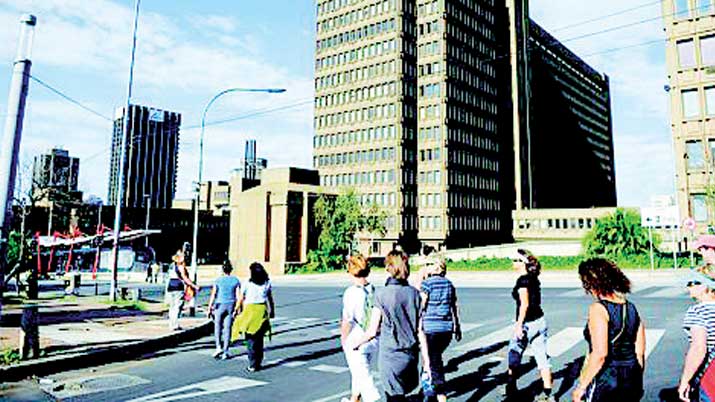City authorities in Johannesburg, SouthAfrica’s economic hub, have unveiledan ambitious plan to undo urbaninequalities of the apartheid era and turnthe continent’s wealthiest city into the “NewYork of Africa”. City mayor Parks Tau saysthe 10-year scheme, which is set to cost some$10 billion (7.5 billion euros), will lead to a“new era” for Johannesburg and its 4.4 millioninhabitants. Plans are on the cards for an extensivenew road and railroad network, betterhouses and revamped buildings to spruce upthe city, originally built on a gold rush in thelate 19th century.The inspiration for change is the cosmopolitanNew York City in the United States, withits attractive bridges, roads and effi cient subwaynetwork and parks. “We are re-inventingthe city of Johannesburg,” Tau said.
“We areturning this city into a New York of Africa,”he added. Offi cials say the project will correcturban planning dating back to white minorityrule, which pushed designated black areas tothe outskirts of the city, with poor access totransport and other infrastructure and services.“This is a major step in reversing the inequalitiescaused by the apartheid regime,”Tau told AFP. In some cases, commuting betweenthe city centre and northern suburbscurrently takes up to nearly two hours.A network of enhanced public transportationenabling people in outlying areas to makeconnections by trains, buses and taxis will beestablished, together with cycle paths.Alison Todes of the University of Witwatersrand’sSchool of Architecture argues thatthe time has come for an effi cient transportsystem that will also help reduce the city’scarbon footprint. “The city is quite spread outand a lot of people use private cars. Less traveltime and less cars on the road will also be goodfor the environment,” Todes said.
The launchthree years ago of a high speed train servicelinking Johannesburg and the administrativecapital Pretoria was a milestone in providingeffi cient public transport.But the train serves limited routes and highfares make it inaccessible to the bulk of theworking class, who rely on crowded privately-run minibus taxis and ageing state-ownedmetro trains. “Our economy is growing, so wesaw a need to prioritise investment on infrastructureto boost the economic capacity ofthe city,” Tau said. The city will fi nance therenovations from its own coffers. Despite itsestablished wealth, boasting the largest concentrationof dollar millionaires in the country,parts of Johannesburg are dirt poor. Clustersof palatial homes protected by gates and electricfences stand side-by-side with sprawlingslums that have no running water and sanitation.
Nearly half a million of Johannesburg’spopulation lives in informal housing. Somehave been on a waiting list for state-subsidisedhouses for 15 years. Almost a fi fth of the totalrenovation budget will be channelled to lowcosthousing schemes dubbed “corridors offreedom”. “Housing is the biggest challengefacing the city. We can’t claim to be a worldclass African city when we still have peopleliving in poor conditions,” Tau said. Buildingimprovements will also reach into the innercity, which has seen an exodus of largebusinesses due to decay and high levels ofcrime. Business giants like the JohannesburgStock Exchange, Africa’s largest bourse, leftthe once-thriving central business district fornorthern suburb Sandton — now the continent’srichest square mile.Many mining fi rms and banks joined theexodus to the north, though a few have startedmoving back. “It is our goal to create a safe,business-friendly environment,” Tau said.In 2009, closed-circuit surveillance cameraswere installed in areas around the inner cityto help fi ght crime. But the main oppositionDemocratic Alliance (DA) party worries thatthe municipality will not be able to monitorspending adequately, amid daily reports ofpublic sector corruption.
For the past three years the city has failedto get a clean bill of health from the country’sauditor general. “We don’t dispute that it is agreat investment, but we need assurances thatpublic funds would be handled effi ciently,”DA spokesman Mmusi Maimane said. “Mymain concern is that there is no capacity tohandle such a huge budget,” he said. AFP

